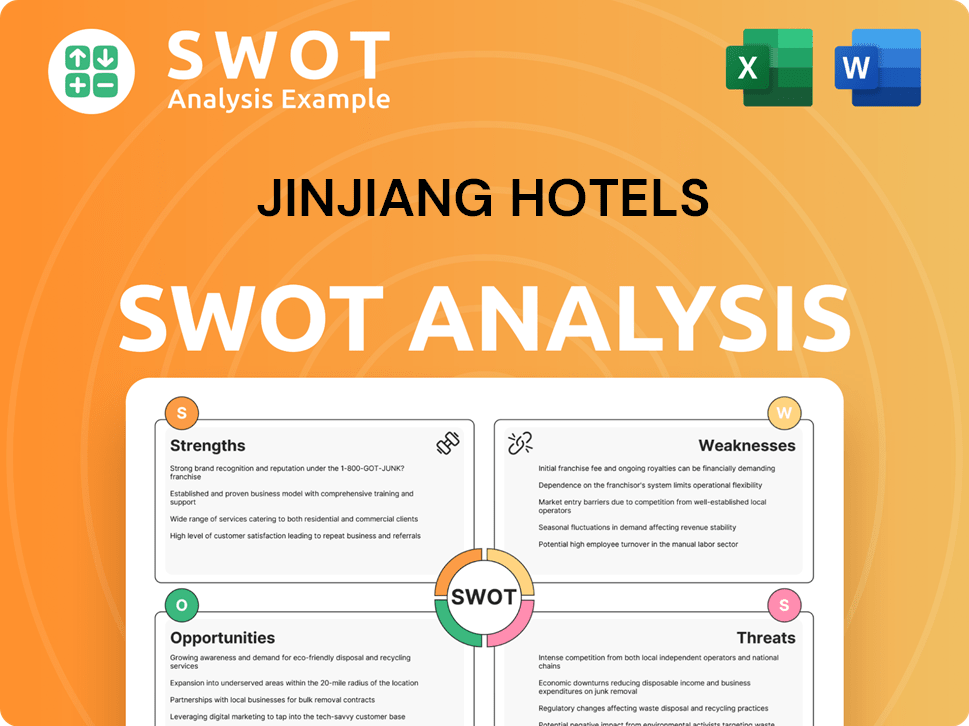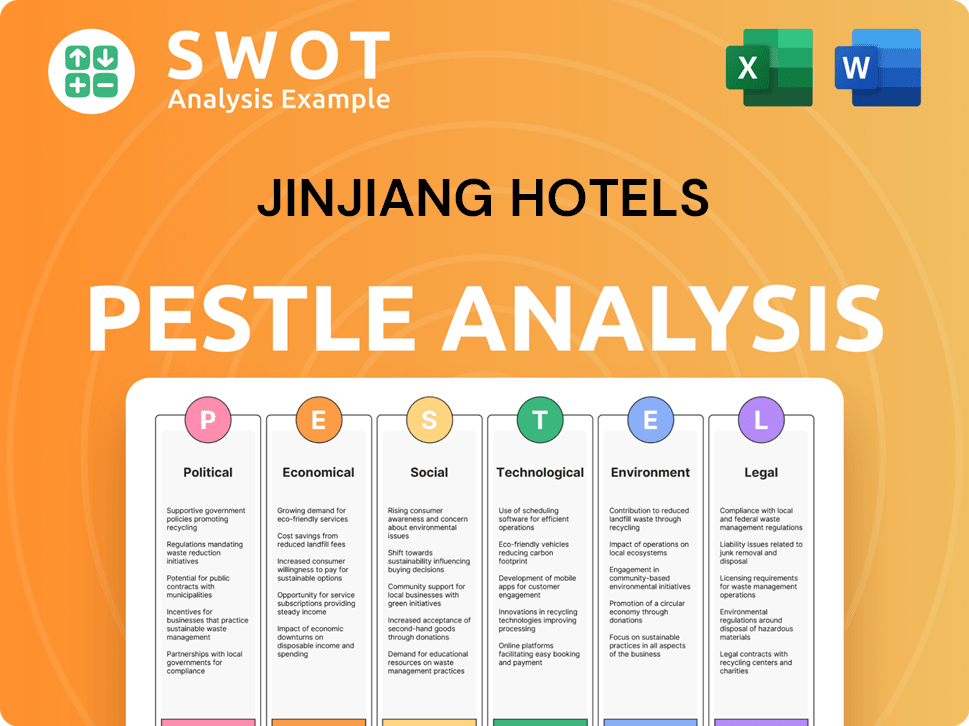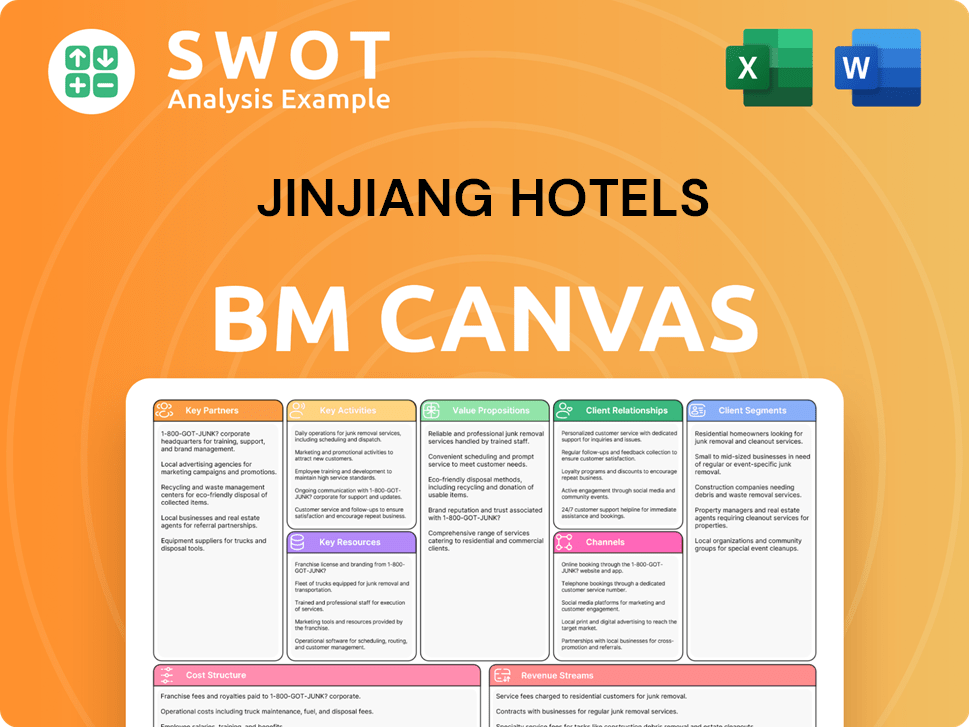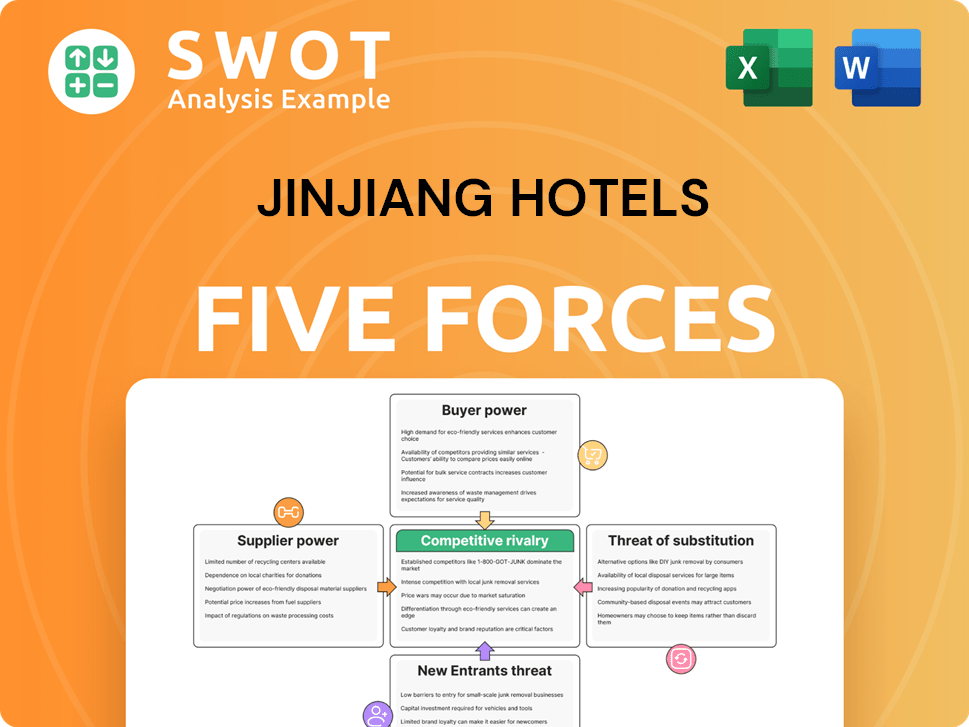JinJiang Hotels Bundle
Who Really Controls JinJiang Hotels?
Unraveling the ownership of JinJiang Hotels is key to understanding its global dominance in the hospitality sector. This Chinese hotel group has rapidly expanded, making strategic acquisitions that have reshaped the industry. Understanding who owns JinJiang is crucial to grasping the company's ambitious growth trajectory and its position in the competitive market.

The ownership structure of JinJiang International, the parent company of JinJiang Hotels, is a fascinating case study in global business strategy. JinJiang Hotels SWOT Analysis can provide deeper insights into the company's strengths, weaknesses, opportunities, and threats, further illuminating the impact of its ownership. Exploring the details of JinJiang Hotels ownership structure, including major shareholders and its status as a state-owned enterprise, offers a unique perspective on its operational accountability and strategic direction. This analysis will shed light on the forces driving one of the world's largest hotel groups, including its financial information and the influence of its management team.
Who Founded JinJiang Hotels?
The ownership structure of JinJiang Hotels is deeply rooted in its origins as a state-owned enterprise in China. Unlike many Western hotel chains that began with individual founders, JinJiang's formation in 1996 was built upon existing hospitality assets controlled by the Chinese government. This means the concept of individual founders with specific equity stakes doesn't directly apply to its initial establishment.
Instead, the initial ownership of JinJiang International was entirely vested in the Shanghai Municipal People's Government. This control was exercised through various state-owned asset management entities. The primary goal was to consolidate and modernize Shanghai's hospitality assets to aid the city's economic growth and burgeoning tourism sector. This approach differs significantly from privately-held startups, where angel investors or early-stage funding rounds are common.
The founding of JinJiang Hotels did not involve angel investors or family members acquiring stakes. The strategic direction was dictated by government policy and economic objectives. Early agreements focused on asset management and operational mandates rather than typical vesting schedules. The government's objective was to support Shanghai's economic development and growing tourism industry. There were no initial ownership disputes, as the ownership remained solely under state control.
In its early stages, JinJiang International was entirely owned and controlled by the Shanghai Municipal People's Government. This ownership structure reflects its roots as a state-owned enterprise. The government's objectives drove the company's strategy and operations.
- The initial focus was on consolidating and modernizing Shanghai's hospitality assets.
- There were no individual founders in the traditional sense, and no early investors.
- The government's strategic goals were aligned with Shanghai's economic development and tourism growth.
- Control was exerted through various state-owned asset management bodies.
JinJiang Hotels SWOT Analysis
- Complete SWOT Breakdown
- Fully Customizable
- Editable in Excel & Word
- Professional Formatting
- Investor-Ready Format

How Has JinJiang Hotels’s Ownership Changed Over Time?
The ownership of Jin Jiang Hotels, under the umbrella of Jin Jiang International, has evolved significantly, largely shaped by strategic acquisitions and its inherent state-owned structure. The Shanghai Municipal People's Government ultimately controls Jin Jiang International (Holdings) Co., Ltd., the parent company, which influences the long-term strategies and financial decisions of the group. The listing of Jin Jiang Hotels (Group) Co., Ltd. on the Shanghai Stock Exchange (SSE: 600754) marked a pivotal moment, introducing public shareholders while maintaining the controlling stake with Jin Jiang International (Holdings) Co., Ltd.
The company's growth strategy has involved substantial acquisitions, including Groupe du Louvre and a stake in AccorHotels. These moves have expanded its global footprint and brand portfolio. The state-owned parent entity finances and directs these acquisitions. While the publicly traded entity includes a diverse range of shareholders, the ultimate strategic direction and decision-making power remain with Jin Jiang International (Holdings) Co., Ltd., reflecting the Chinese government's investment in the tourism sector. As of early 2024, this ownership structure remains consistent, highlighting the blend of public and state interests in the company.
| Key Event | Impact on Ownership | Year |
|---|---|---|
| Listing of Jin Jiang Hotels (Group) Co., Ltd. on the Shanghai Stock Exchange | Introduced public shareholders, but maintained state control through Jin Jiang International (Holdings) Co., Ltd. | Ongoing |
| Acquisition of Groupe du Louvre | Expanded brand portfolio and global reach, financed by the state-owned parent. | 2015 |
| Acquisition of Stake in AccorHotels | Further expanded international presence; stake has since been reduced. | 2016-2018 |
Understanding the ownership structure is key to grasping the strategic direction of the company. The state-owned nature of Jin Jiang International, coupled with its public listing, creates a unique blend of public and private interests. The major stakeholders include institutional investors and individual shareholders, but the ultimate control rests with the Shanghai Municipal People's Government. This structure influences the company's long-term goals and operational decisions. For those interested in the financial aspects, information can be found in the official website.
Jin Jiang Hotels is primarily owned by the state through Jin Jiang International (Holdings) Co., Ltd.
- The Shanghai Municipal People's Government ultimately controls the company.
- The company has a public listing on the Shanghai Stock Exchange.
- Major acquisitions have expanded its global presence.
- The state-owned parent entity drives strategic direction and finances acquisitions.
JinJiang Hotels PESTLE Analysis
- Covers All 6 PESTLE Categories
- No Research Needed – Save Hours of Work
- Built by Experts, Trusted by Consultants
- Instant Download, Ready to Use
- 100% Editable, Fully Customizable

Who Sits on JinJiang Hotels’s Board?
The board of directors of Jin Jiang Hotels (Group) Co., Ltd., the publicly listed entity, typically includes representatives from its parent company, Jin Jiang International (Holdings) Co., Ltd., and independent directors. The composition of the board reflects the ownership structure, ensuring alignment with the strategic objectives of the state-owned parent. As of late 2024, the board structure is designed to comply with regulatory requirements for listed companies, incorporating both executive and independent directors to oversee the company's operations and strategic direction. The board's makeup is subject to change, but it generally includes individuals with significant experience in the hospitality industry and representatives from the controlling shareholder.
The board's influence stems from its role in major decision-making processes, including strategic planning, financial oversight, and executive appointments. The board's actions are closely aligned with the interests of Jin Jiang International (Holdings) Co., Ltd., which holds a significant stake in the company. This alignment ensures that the overall strategic direction of Jin Jiang Hotels is consistent with the broader goals of its parent company and the state-owned enterprise framework. The board's decisions are also influenced by the need to maintain compliance with relevant regulations and corporate governance standards.
| Board Member Category | Description | Influence |
|---|---|---|
| Representatives from Jin Jiang International (Holdings) Co., Ltd. | Individuals representing the interests of the parent company. | Significant influence over strategic decisions and corporate governance. |
| Independent Directors | Directors who are independent of the company's management and major shareholders. | Oversee management, ensure compliance, and protect the interests of minority shareholders. |
| Executive Directors | Individuals who are also part of the company's management team. | Provide operational expertise and contribute to the implementation of strategic plans. |
The voting structure of Jin Jiang Hotels (Group) Co., Ltd. is primarily driven by the significant shareholding of Jin Jiang International (Holdings) Co., Ltd. While the publicly traded shares generally adhere to a one-share-one-vote principle, the controlling stake held by the parent company grants it substantial influence over board appointments, major strategic decisions, and corporate governance. This structure reflects the ownership structure of JinJiang Hotels as a state-owned enterprise, where the ultimate decision-making authority rests with the parent company. Proxy battles or activist investor campaigns are unlikely to significantly alter the current ownership and governance structure.
The primary determinant of voting power in Jin Jiang Hotels is the shareholding of Jin Jiang International (Holdings) Co., Ltd. The parent company's stake enables it to control board appointments and strategic decisions.
- One-share-one-vote principle applies to public shares.
- Jin Jiang International (Holdings) Co., Ltd. holds a controlling stake.
- State ownership influences decision-making.
- Proxy battles are unlikely to affect the structure.
JinJiang Hotels Business Model Canvas
- Complete 9-Block Business Model Canvas
- Effortlessly Communicate Your Business Strategy
- Investor-Ready BMC Format
- 100% Editable and Customizable
- Clear and Structured Layout

What Recent Changes Have Shaped JinJiang Hotels’s Ownership Landscape?
Over the past few years (2022-2025), the ownership structure of JinJiang Hotels, specifically concerning its parent company Jin Jiang International, has largely remained consistent. The company continues to operate under a state-owned framework, a characteristic that has persisted despite global economic volatility and significant changes within the hospitality sector. While the ultimate ownership hasn’t seen major shifts, Jin Jiang International has persistently pursued strategic expansion. This expansion impacts its operational scope and the composition of its public shareholding. For example, in early 2024, Jin Jiang Hotels reported a substantial increase in its hotel count, reaching over 12,000 hotels with over 1.2 million rooms worldwide.
The publicly traded subsidiary of Jin Jiang, has seen industry trends like increased institutional ownership and consolidation. Although institutional investors hold shares, the state-owned parent maintains control. The global hospitality industry has seen considerable merger and acquisition activity, and Jin Jiang has been a significant participant. This activity has solidified its position as one of the largest hotel groups worldwide by room count. Further insights into the growth strategy of JinJiang Hotels can be found in this article: JinJiang Hotels' Expansion Strategy.
There have been no public statements from the company or analysts indicating any plans for privatization or a significant reduction in the state's controlling stake. The focus remains on leveraging its scale and brand portfolio to capture market share, particularly in China and key international markets. The state ownership provides stability and access to capital for long-term initiatives, distinguishing it from privately or widely held competitors. This stability is crucial in a dynamic market like the hotel industry, allowing Jin Jiang to pursue long-term growth strategies and maintain its competitive edge.
The ownership structure of Jin Jiang Hotels has remained largely stable, with the state-owned parent company maintaining control. This stability has provided a solid foundation for the company's expansion and strategic initiatives. This is critical in an industry prone to fluctuations.
Jin Jiang continues its strategic expansion, both organically and through acquisitions. This growth strategy has allowed the company to increase its hotel count and global presence significantly. The company's growth is a key indicator of its success.
Jin Jiang is focused on capturing market share in China and key international markets. This strategic focus helps the company to leverage its brand portfolio and scale. The company is adapting its strategy to different markets.
The hospitality industry is experiencing significant consolidation and increased institutional ownership. Jin Jiang is navigating these trends while maintaining its core ownership structure. The company's ability to adapt to industry trends is key.
JinJiang Hotels Porter's Five Forces Analysis
- Covers All 5 Competitive Forces in Detail
- Structured for Consultants, Students, and Founders
- 100% Editable in Microsoft Word & Excel
- Instant Digital Download – Use Immediately
- Compatible with Mac & PC – Fully Unlocked

Related Blogs
- What are Mission Vision & Core Values of JinJiang Hotels Company?
- What is Competitive Landscape of JinJiang Hotels Company?
- What is Growth Strategy and Future Prospects of JinJiang Hotels Company?
- How Does JinJiang Hotels Company Work?
- What is Sales and Marketing Strategy of JinJiang Hotels Company?
- What is Brief History of JinJiang Hotels Company?
- What is Customer Demographics and Target Market of JinJiang Hotels Company?
Disclaimer
All information, articles, and product details provided on this website are for general informational and educational purposes only. We do not claim any ownership over, nor do we intend to infringe upon, any trademarks, copyrights, logos, brand names, or other intellectual property mentioned or depicted on this site. Such intellectual property remains the property of its respective owners, and any references here are made solely for identification or informational purposes, without implying any affiliation, endorsement, or partnership.
We make no representations or warranties, express or implied, regarding the accuracy, completeness, or suitability of any content or products presented. Nothing on this website should be construed as legal, tax, investment, financial, medical, or other professional advice. In addition, no part of this site—including articles or product references—constitutes a solicitation, recommendation, endorsement, advertisement, or offer to buy or sell any securities, franchises, or other financial instruments, particularly in jurisdictions where such activity would be unlawful.
All content is of a general nature and may not address the specific circumstances of any individual or entity. It is not a substitute for professional advice or services. Any actions you take based on the information provided here are strictly at your own risk. You accept full responsibility for any decisions or outcomes arising from your use of this website and agree to release us from any liability in connection with your use of, or reliance upon, the content or products found herein.